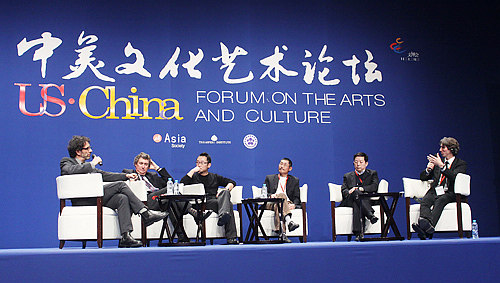|
 |
|
ARTISTS GATHERING: Panelists discuss the challenges of film making at the U.S.-China Forum on the Arts and Culture on November 17, 2011. They are (from left to right) directors Joel Coen, David Fanning, executive producer of FRONTLINE, Chinese directors Lu Chuan and He Ping, film scholar Jia Leilei, and moderator Damian Woetzel (CFP) |
As the world becomes ever more globalized, every aspect of social, economic and cultural life is subject to change and influence from the outside world, the film industry is no exception.
More and more Chinese elements are now being incorporated into American movies such as Kungfu Panda. And Chinese directors are increasingly trying to adopt a more Hollywood style of movie-making.
Last week saw movie makers from China and the United States sit together and discuss this fast changing industry at the U.S.-China Forum on Arts and Culture, which was held in Beijing from November 16-19, 2011.
The forum was the first of its kind and drew a great deal of attention as a number of big names attended the event—American actress Meryl Streep, director Joel Coen, Lu Chuan, a leading Chinese director, and Ge You and Liu Ye, two stars of Chinese cinema, all attended the event.
Most of those who attended the forum were from Chinese and international film-making circles. Among the seven panels held during the four-day forum, three concerned movie making and two movies were shown: True Grit directed by Joel Coen and The Iron Lady starring Meryl Streep.
"During the forum, we talked paintings, we talked novels and of course we talked about food, but mainly we talked about movies. It was a lot of fun," said Mark Danner, a U.S. writer who gave the opening speech at a panel attended by American directors Joel Coen and David Fanning as well as Chinese movie directors Lu Chuan and He Ping. "Every time when we watch movies, we sit in the darkness and focus all our attention on a lighted screen, becoming soaked in the story it tells, it's a miracle."
"As movie directors, we have to make choices all the time—what stories do we want to tell?" said Lu Chuan famed for the highly acclaimed Mountain Patrol (2004) and City of Life and Death (2009). "Sometimes, I rely on my own thought and instincts to make the choice."
Lu took Mountain Patrol as an example. "I learnt the news on the preservation of Tibetan antelope from the newspapers, which gave me the inspiration for the film." As a Beijing native, Lu then moved to Hoh Xil in the Tibetan Plateau and stayed with the local people. During his time there, he wrote dairies to record events and moments that touched him.
"The movie is based on a true story and I incorporated some of the events from my diaries in the movie as well," said Lu.
But truth in movies is a very subjective thing. Joel Coen, who directed the enormously successful movie Fargo, which was released in 1996, disclosed that he had not been entirely honest with his audience. "At the beginning of the movie we announced that the film is based on a true story. But actually it's not," said Coen.
"We didn't want to lie, but we did because we used a very original and creative narrative that we didn't think our audiences would accept if they thought it was fiction."
Danner expressed his sympathy with Coen's dilemma. He told audiences about his time reporting in Iraq, "The truth sometimes is more unbelievable than a made-up story. We use reality as a crutch to support the improbability of the story," he said.
Danner said he realized while reporting in Iraq that truth is a very difficult thing to apprehend.
"Before I went to Iraq, from thousands of miles away, I thought I already knew the problems and disasters I would encounter in Iraq, and I felt I had a concrete conception of what the Iraq war was from the news," he said. "But after I arrived there, I started interviewing people and traveling. It was intense. I was making every effort I could, but all of a sudden, I realized that I knew nothing. This is the moment I treasure as a reporter—I get the whole idea of Iraq but I don't know a thing."
| 